Skill #1
Developing Your Sandbox

My name is Owen Collander, and I am in my last semester at Roanoke College. I am a History major with a concentration in Public History. Originally from North Carolina, I decided to come to Roanoke in order to have access to smaller class sizes and the faculty at the College. Since I have been at Roanoke College, I have been able to do many exciting things. I lived in DC for a time, I’ve had the opportunity to create a documentary, and overall I have enjoyed my time spent here. I also have a lot of animals at my house, including horses.
Skill #2
Digitization and Metadeta
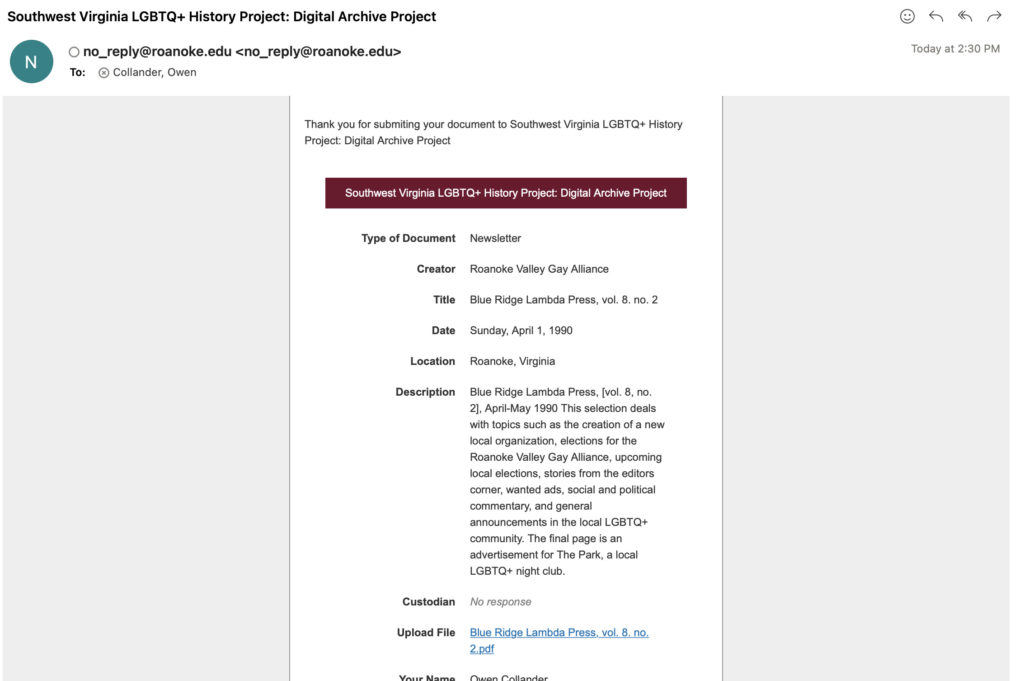
As one can see, this is the metadata that is used to categorize and sort through the work that comes into the collection. With this, it will be much easier for someone to find the document if they know what words to search up. This document was not born digital, but it was rather digitized and can now be accessed online.
Skill #3
Machine Reading and Distant Reading
Skill Subset #1: Using OCR to examine Southern perceptions of Victoria Woodhull

“Excerpt,” The Charlotte Democrat, (Charlotte, North Carolina), February 21st, 1876, p. 3. SOURCE: Chronicling America, Library of Congress.
As seen with this newspaper article written in Charlotte, North Carolina, Victoria Woodhull seems to be held in an unfavorable view. This clipping comes from the second to last page in the collection, indicating a level of unimportance compared to other material. The use of the word “notorious” and the mention of poor attendance leads one to this conclusion. Certainly her viewpoints on suffrage and women’s rights alienated many in the South at the time.
Skill Subset #2: Comparison of presidential inaugural addresses given before the United States entered into war, Wilson VS. FDR
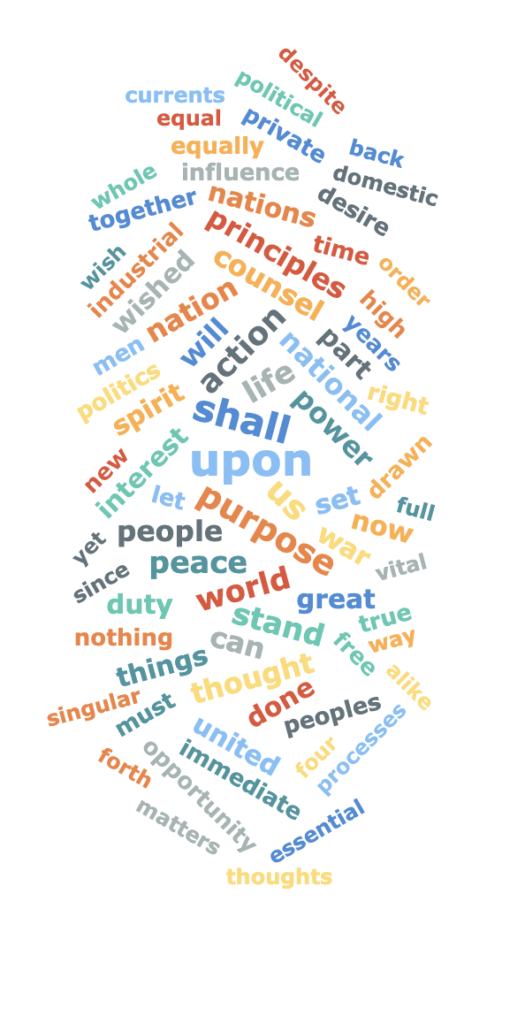
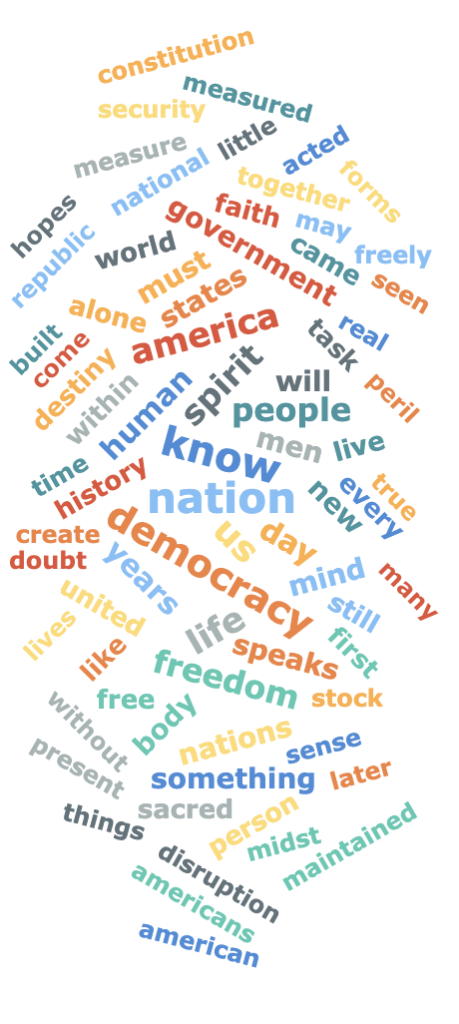
Word clouds that were created from Woodrow Wilson’s 1917 inaugural address (left) and Franklin Roosevelt’s 1941 inaugural address. SOURCE: The American Presidency Project.
When examining these two addresses, a common theme links the two: the shadow of war looming not far into the immediate future. Wilson guided the United State’s involvement in the First World War, much like what FDR would do during the Second World War. Yet, both these speeches were given before the United States entered the war. I wanted to see what how each president dealt with the situation at hand. Aware of the tenuous situations at hand, both presidents make calls for unity, and draw on the founding principles of America, such as freedom, democracy, etc. Wilson’s re-election campaign was based on the notion that had kept America out of war in 1914, so the references to peace and the world indicate that he still seeks to avoid war. While FDR does not make reference to peace, he also recognizes the danger faced, with words like disruption and peril appearing. Democracy being the largest word in the graphic makes sense, as the conflict was, for many, between democracy and the antithesis of it: fascism. Both presidents sought to keep their nation together and weather the storm, however, as seen in both speeches. Most strikingly, both seem to reference purpose, either directly or indirectly through the referencing of history and spirit.
Skill Subset #3: Google Ngram
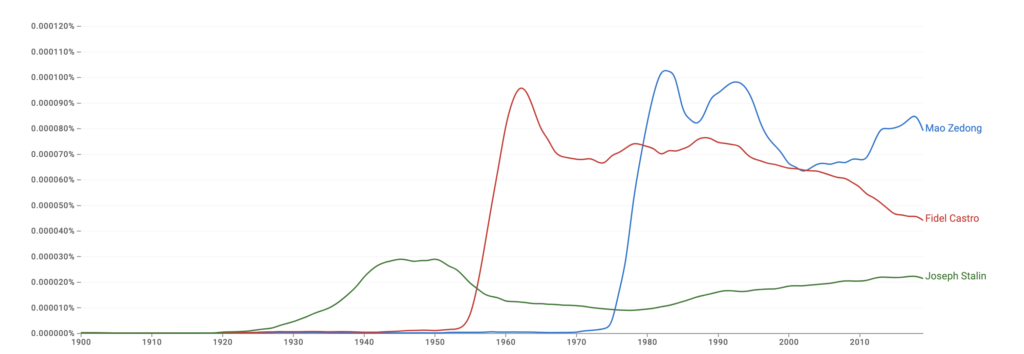
Google Ngram analysis of the names Mao Zedong, Fidel Castro, and Jospeh Stalin as they appear in English-language books published between 1950 and 2019 from the Google Books database. SOURCE: Google Books Ngram Viewer.
I chose to focus on three prominent communist leaders to see what decades/years they were receiving the most attention/interest in English books. With Stalin, one can see that the most prominent interest came from when he was alive, beginning to wane after his death in 1953, although it is worthy to note that with the fall of the Soviet Union, Stalin’s appearance in literature appears to grow, perhaps due to historians analyzing the Soviet Union as a whole once it existed only in the past. Fidel appears to have skyrocketed to popularity with the Cuban Revolution. A specific year, 1962, stands out at the peak. This is the year that the cuban missile crisis took place, it seems like at that point, everyone wanted to know who this man was and what he was doing 90 miles off the coast of Florida. His popularity remained high, perhaps due to his influence over many rebel groups that existed in much of Central and South America. As for Mao, this result surprised me. One would assume that mention of him would skyrocket in 1949 with his successful takeover of China, yet that is not the case. It appears that it did not occur until only 2 years before his death in 1976. I searched to see if perhaps books referenced him with a different spelling, but it seemed like this was the only real result. I am extremely curious as to why this is, and I don’t have a reasonable explanation. Perhaps more digging would reveal an answer. Yet, as one can (mostly) see, it appears that the attention given to these leaders were highest at specific events they were involved in or during their lives.
Skill #4
Using Google Maps to examine British fat import source data and practice mapping sites
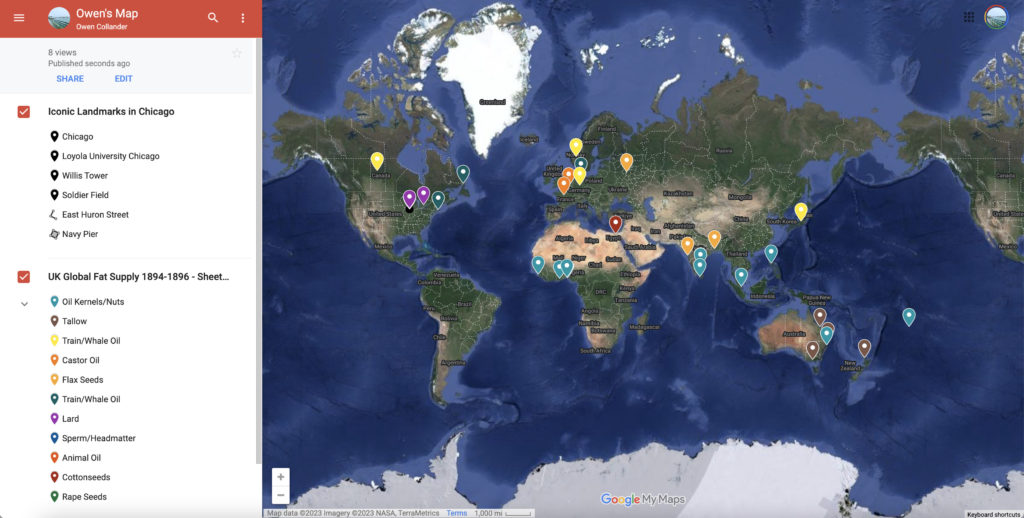
By either clicking on this link or the image itself, you can explore a map of both the UK global fat supply, and also a brief tour around some iconic places in Chicago. The link between Chicago and the UK global fat supply is an interesting one, with the city being a key supplier of lard to the United Kingdom. Perhaps that trade passed along one of the streets, even perhaps the one I marked, back then. Regardless, Chicago is an interesting city, and I was surprised to see it be a key source of fat to the United Kingdom.
Skill #5
Creating Timelines
Skill #6
1 Minute Audio Tour
Skill #7
Creating a Video Game
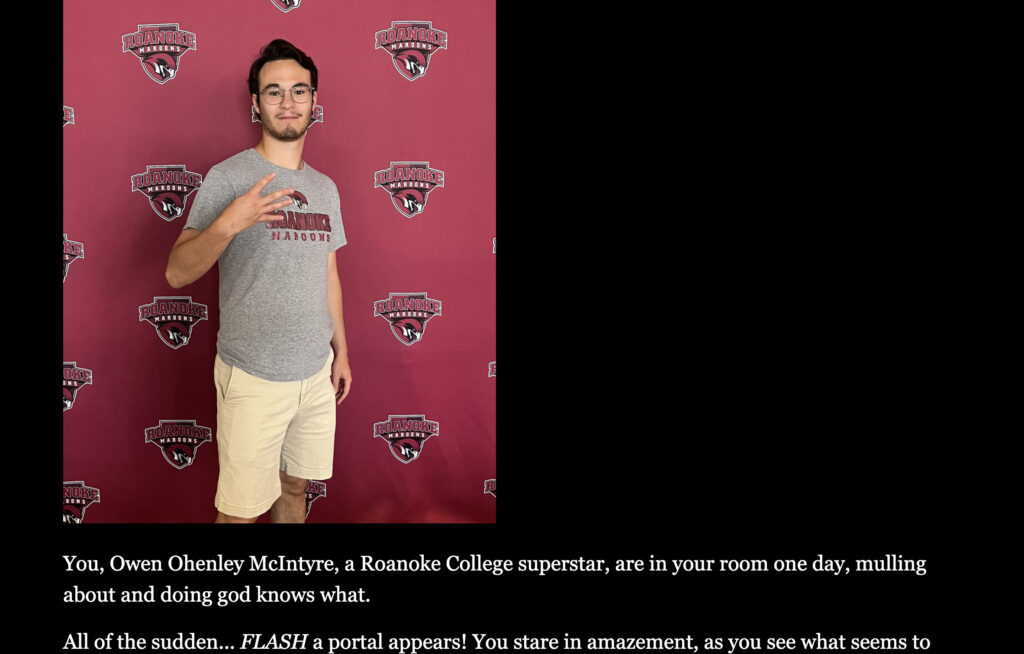
Check out my Twine, a text-based video game. To play, click on this link. The link will pull up an HTML file. Click “Download.” Now, open the website for Twine, click “Use in your Browser.” Click “Library,” then “Import,” and choose the HTML file you just downloaded. Click on the imported story. Now click “Build,” then “Play.” Voila: it’s my game!